- Home
- Jane Peart
Promise of the Valley
Promise of the Valley Read online
promise of the valley
a westward dreams novel
Books by Jane Peart
Brides of Montclair Series
1 | Valiant Bride
2 | Ransomed Bride
3 | Fortune's Bride
4 | Folly's Bride
5 | Yankee Bride/Rebel Bride
6 | Gallant Bride
7 | Shadow Bride
8 | Destiny's Bride
9 | Jubilee Bride
10 | Mirror Bride
11 | Hero's Bride
12 | Senator's Bride
13 | Daring Bride
14 | Courageous Bride
Westward Dreams Series
1 | Runaway Heart
2 | Promise of the Valley
3 | Where Tomorrow Waits
4 | A Distant Dawn
5 | Undaunted Spirit
The American Quilt Series
1 | The Pattern
2 | The Pledge
3 | The Promise
ZONDERVAN
promise of the valley
Copyright © 1995 by Jane Peart
All rights reserved under International and Pan-American Copyright Conventions. By payment of the required fees, you have been granted the non-exclusive, non-transferable right to access and read the text of this e-book on-screen. No part of this text may be reproduced, transmitted, down-loaded, decompiled, reverse engineered, or stored in or introduced into any information storage and retrieval system, in any form or by any means, whether electronic or mechanical, now known or hereinafter invented, without the express written permission of Zondervan.
ePub Edition July 2009 ISBN: 978-0-310-83290-4
Value Edition 978-0-310-28800-8
Requests for information should be addressed to:
Zondervan, Grand Rapids, Michigan 49530
* * *
Library of Congress Cataloging-in-Publication Data
Peart, Jane.
Promise of the valley / Jane Peart.
p. cm. — (Westward dreams series)
ISBN 0-310-41281-1
1. California — History — 1850 — Fiction. 2. Women pioneers — California — Napa River Valley — Fiction. 3. Napa River Valley (Calif.) — History — Fiction. I. Title. II. Series: Peart, Jane. Westward dreams series.
PS3566.E238R76 1995
813'.54 — dc20
94-44198
CIP
* * *
All rights reserved. No part of this publication may be reproduced, stored in a retrieval system, or transmitted in any form or by any means — electronic, mechanical, photocopy, recording, or any other — except for brief quotations in printed reviews, without the prior permission of the publisher.
* * *
08 09 10 11 12 13 14 15 16 • 21 20 19 18 17 16 15 14 13 12 11 10 9 8 7 6 5 4 3 2 1
CONTENTS
Cover Page
Title Page
Copyright
Prologue
PART 1
CALISTOGA, CALIFORNIA
Chapter 1
Chapter 2
Chapter 3
Chapter 4
Chapter 5
PART 2
SILVER SPRINGS RESORT
Chapter 6
Chapter 7
Chapter 8
Chapter 9
Chapter 10
Chapter 11
PART 3
SILVERADO SPRING
Chapter 12
Chapter 13
Chapter 14
PART 4
VALLEY OF THE HEART
Chapter 15
Chapter 16
Chapter 17
Chapter 18
Epilogue
About the Publisher
Share Your Thoughts
To Lloyd,
with gratitude
for his generous help and patience
Prologue
VIRGINIA
SEPTEMBER 1870
Adelaide Pride looked up at the blackened structure—all that remained of her beloved grandparents' home, Oakleigh. Between two charred chimneys the roof lay open to the sky. Gutted. Torched by the Yankee invaders. All that was left of the once beautiful house were the burned, crumbling rafters, the sagging floors, and the scorched walls.
Her hands clenched in helpless fury. Why had it been necessary to destroy it? After the battle of Seven Pines, the Union Army had used it for temporary headquarters. Why had they felt it necessary to burn down the place when they left? Just another case of the wanton destruction that generated so much of the blind hatred throughout the South since the war's end.
From behind her came the soft voice of her aunt Susan waiting in the small one-horse buggy. "Addie, dear, better come along now. It'll be getting dark soon, and it's a long drive back to town."
"Yes, Auntie, I'm coming," Addie called. Still she could not seem to move. Memories of the past held her prisoner. Oakleigh was her grandparents' home. There, as a child, she had in summer played on the velvety lawn under the sweeping boughs of the giant trees that surrounded it while the adults carried on leisurely conversations on the shady verandah. Images floated back to her hauntingly. Days of gracious hospitality, gaiety, laughter; lazy summer evenings of soft dusk and flitting fireflies.
Was it really possible that all that was gone? Was it all lost as surely as the cause for which so many of her cousins, her friends, her beaux, had fought?
"Adelaide, we must go," Aunt Susan's pleading reminder came again. "Honey, the livery stable closes at six, remember? We have to get the horse and rig back before then."
Addie sighed. She needed no reminder that they no longer could afford to keep horses themselves and had to rent them to drive out this afternoon. With sad reluctance she turned from the skeleton of the house and climbed into the buggy beside her aunt.
The older woman placed a sympathetic hand on Addie's arm. "I know, darlin', what you're feeling. There's no use standing around mournin'. It won't bring anything back—or anyone. The main thing is that we survived, and we have to go on."
"But it's all such a waste, Auntie! So much and so many lost. Like Ran." They were silent a minute, thinking of Randolph Payton, the man Addie had expected to marry, who was killed in the battle of Antietam. Addie also thought of her parents, both of whom had died by the end of the war.
Aunt Susan patted Addie's hand. "But you're young, Addie. You've still got your whole life ahead of you. Don't let what's happened embitter you. Too many have gone that route." Addie knew her aunt meant her own husband, Uncle Myles, whose unrelenting anger at the South's defeat had transformed him into a twisted, emotionally crippled man—old before age sixty.
"I don't intend to, Aunt Susan. After today, I'm not going to look back." Addie drew on her driving gloves, picked up the reins, and clicked them. The horse moved forward. "That's why I've decided to take that position with Mrs. Amberly," she said resolutely, looking straight ahead.
Her aunt gave a little gasp. "Surely not! Not with that—that Yankee woman!"
"What choice do I really have, Auntie? Yankees are the only ones with any money these days. The salary she's offered is more than I could hope to make at any job here. And I need a way to support myself."
"But to go all the way out to California!"
Addie lifted her chin determinedly. "What else can I do?"
Her aunt shook her head silently, pressing her lips together. For the next few minutes, as they rode along, the only sound was the soft clop-clop of the horse's hooves on the dusty country road. She knew Addie was right. Her niece had been left without family, fiancé, or fortune. What else was there for an impoverished Southern gentlewoman to do? At twenty-five, in the South, Adelaide was considered hopelessly on the brink of spinsterhood. Particul
arly now that so few eligible men of her age and class had returned from the war. Marriage seemed a remote possibility. What alternative did she have but to take the offered position as companion to an elderly widow?
The job offer had come through a distant cousin of Susan's. One of his "new" Yankee friends had asked him if he knew of a refined young lady to be the paid companion of his great-aunt Sophia Amberly at a famous soda hot springs health resort in the Napa Valley of California.
Susan had refused to have anything to do with Cousin Matthew since he began doing business with their despised conquerors. Many affluent Northerners had swarmed into Richmond since the surrender, buying homes and property the natives could no longer afford. Matthew, however, had assured the man he had the "perfect answer" to his elderly relative's search for a "young, healthy, intelligent, ladylike" employee. The salary offered was one Adelaide felt she could not turn down.
Susan glanced over at her niece's cameo-like profile. Before the war, everything would have been so different for a young lady of Adelaide's beauty and breeding. She had certainly inherited both parents' good looks, if nothing else. She had her Carrington mother's high-arched nose; winged eyebrows; dark, lustrous, and silky hair; marvelous eyes the color of cream sherry. Of course, her erect carriage and the elegant set of her head were all definitely Pride.
Pride! Her name could not have been more appropriate, thought Susan, although some called it stiff-necked stubbornness. But maybe that's what would carry Addie through whatever lay ahead of her now. Surely, she'd need all the strong will and strength of character she could muster as she set out on her new uncertain future.
The next few weeks were busy ones, full of preparations for Addie's long journey. Hours were spent stirring dye into pots of boiling water to renew or freshen faded dresses, turning hems, changing buttons, adding braid or bows, to get Addie's wardrobe ready to pack. She and Aunt Susan stayed so busy, in fact, that there was little time to dwell on the parting they both knew lay ahead.
A few days before she was to leave for California, Addie went out to the cemetery. The September day was warm Indian summer lingered. She opened the wrought-iron gate and entered the enclosure, then walked toward the Pride family plot.
At the foot of the two headstones engraved with the names Spencer and Lovinia Pride, she place the mixed bouquet of late-blooming fall flowers from Aunt Susan's garden: asters, cosmos, Queen Anne's lace. Standing there for a few moments, Addie was lost in affectionate remembrance of her parents: her tall, strong-featured father, with his kind eyes and humorous mouth; her gentle mother, known endearingly to all as "Lovey." They had given Addie a wonderful heritage, and she was only beginning to appreciate it. All the values they had lived, she silently promised to try to practice in whatever lay before her.
After a few moments of reflection, Addie moved on through the graveyard, pausing here and there to read inscriptions on the markers. Many names she recognized. Boys she had grown up with who had gone off as soldiers and never returned.
A cloud passed over the sun, suddenly darkening the afternoon as though mourning these who had died too soon, without living out their lives, finding love, having families.
Then she reached the grave she was looking for and placed her smaller bouquet on the granite stone marked "Randolph Curtis Payton, Lieutenant Confederate Army, 1840-1861." A smile touched her lips as she thought of Ran, his bravado, his laughter, his light-hearted optimism when he had told her good-bye on that long-ago day he had ridden off to join Lee's army. He had been twenty, she sixteen. A hundred years ago!
Her arms, now empty of flowers, fell to her sides. She had come to say her farewells, now it was time to go. In six weeks' time, she would be far away from all she had ever known. Slowly she turned and walked out of the cemetery, closing the scrolled gates behind her.
Her hardest good-byes were still to come. To leave her aging aunt and uncle, who had taken her in after her parents' deaths, would be the most difficult of all.
Mixed with her natural sadness at the parting, however, Addie felt a faint stirring of excitement. After all, was this not going to be the great adventure of her life? Although Addie had always been considered imaginative, something blocked all but the faintest vision about California. The future seemed hidden by a dim curtain of uncertainty.
Oct. 10th, 1870
Well, here I am, off on my journey—"the greatest adventure of my life," as dear Emily described it. Emily Walker, who has been my best friend for as long as I can remember, gave me this leather-bound journal as a going-away present. She told me it was to be filled with all the wonderful and exciting things that are going to happen to me on this trip and in my new life in California. Emily has always been an incurable optimist. Even when Evan, her husband, a strapping six-footer, came home a helpless cripple after losing his leg at Gettysburg, Emily never gave way. Dear gallant Emily. We were to be bridesmaids at each other's weddings. I was hers, but she never got the chance to be mine. Ran died the first year of the war.
I do wonder with what I'll fill these blank pages.
Cousin Matthew, full of self-importance, came out to Avondale with his fine new carriage to drive me to Richmond and escort me to the train station. When he arrived, Aunt Susan treated him coolly. She has stated over and over that she cannot abide to be around him since he's "taken up with those carpetbaggers—even though he is kin." But I cannot afford that luxury. After all, he arranged for me to take this position with Mrs. Amberly, which will provide me with money enough to send back to Aunt Susan and Uncle Myles. It will be enormously helpful to them. It is more than I could earn any other way—especially here in the South, crushed and defeated and with a surplus supply of impoverished gentlewomen with few or no "marketable" kills. With the salary she is paying me, I can also accumulate a little nest egg for the future. A future as a spinster, in all probability!
Aunt Susan was teary but brave as we said good-bye. When I gave her a last hug, I could feel her tiny birdlike bones under the thin shawl, and I almost said I wasn't going. But I knew I must. I climbed into Matthew's shiny buggy, with its new-smelling leather seat, and I nearly fell out waving to Aunt Susan as she stood at the gate.
When we got to Richmond, Cousin Matthew saw to my trunk and assorted baggage. As we waited on the train platform, he shifted from one foot to the other, hemming and hawing and trying to make conversation—feeling uncomfortable, but doing his "familial duty." Aunt Susan lamented that before the war, no lady would travel unless accompanied by a male relative or a maid. Since I have no maid, Cousin Matthew was my only option. Finally, when the whistle blew, he handed me a box of bonbons and pressed two twenty-dollar gold pieces into the hand I extended to bid him good-bye. Then he hurried off, obviously mighty relieved to have me safely on board and settled in my seat. Could he possibly feel guilty that he is sending his cousin off into the unknown?
Aunt Susan packed me a hamper, fearing I had to go three thousand miles without any food, and she also gave me plenty of instructions and advice. My very outfit is the result of her strongest admonition about journeying alone. She insisted that I wear black, declaring, "For a lady traveling alone, wearing mourning is the best protection to avoid unwelcome attention from undesirable fellow travelers." I agreed, not only to put the dear lady at ease, but also because it could not be more appropriate. I am in mourning. I have lost everything I once held dear in life: parents, home, inheritance, the man I was to marry.
But so has everyone else I know. Certainly Aunt Susan and Uncle Myles lost everything—property, servants, a splendid home where she entertained lavishly many notables, including President Jefferson Davis himself. Emily and Evan too are nearly destitute. Yet I look on these two couples with some envy. They may have lost everything material, but they still have each other. The love and devotion between them is so tender, so beautiful to behold, that I find myself bereft. There's a longing within me for something to fill that void in my heart.
When I opened this book, I saw t
he inscription Emily had written: "Journeys end in lovers meeting." Didn't I say Emily was an optimist? She is also a romantic. But could she be a prophet as well? Only time will tell. On to California.
PART 1
CALISTOGA, CALIFORNIA
NOVEMBER 1870
Chapter 1
Calistoga! Next stop, Calistoga!" the conductor's voice rang out as he wove his way down the aisle of the passenger coach.
"Thank goodness, at last!" Addie murmured with heartfelt relief. Although the last few hours of winding through the beautiful Redwood-covered hillsides on either side of the railroad tracks had been lovely, she was glad to reach her final destination at last—after all these weeks of traveling.
Her cross-country trip had been an adventure to say the least. In 1870, westward-bound trains boasted none of the amenities of eastern trains, which now had dining and Pullman cars. The western railway companies made no effort to make travel easy or comfortable for passengers. Clean hotels were nonexistent. In their place were rustic buildings with cots, hardly a proper resting place for a genteel person. Meal stops were mostly at towns consisting of a shack, dignified as a "depot," a saloon, and a water tank. Food was beyond description. What meals were available were often inedible. They were usually served by a saloon keeper or bartender, for there never seemed to be a scarcity of "spirits" for those who would rather drink than eat the awful fare provided. The menu rarely varied: greasy meat fried to a crisp, canned beans, biscuits called "sinkers," rancid butter, bitter coffee. One either had to develop a sense of the ridiculous or a cast-iron stomach along the way. The last straw was that the "rest and refreshment" stops were limited to twenty minutes, just long enough for the train crew to take on water. This gave the harried passenger a choice of bolting what food he or she could eat or taking a few minutes of fresh air and exercise before reboarding and enduring another long, grueling ride in the cramped quarters of the coach.
Addie enjoyed the scenery, however, which was so different from anything she had ever seen. Still, after a while, the hundreds of miles of wild prairies and endless deserts became monotonous, and she longed for the sight of civilization.

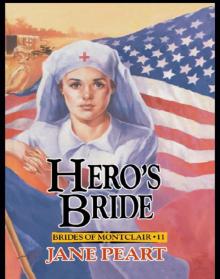 Hero's Bride
Hero's Bride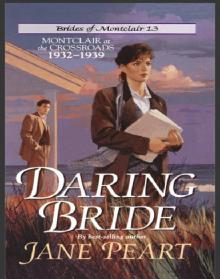 Daring Bride
Daring Bride Runaway Heart
Runaway Heart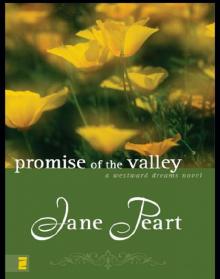 Promise of the Valley
Promise of the Valley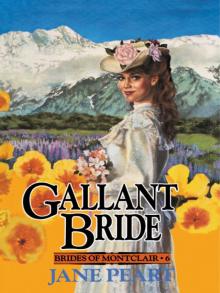 Gallant Bride
Gallant Bride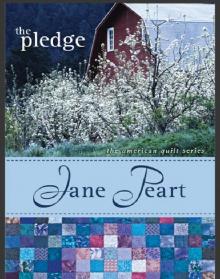 The Pledge, Value
The Pledge, Value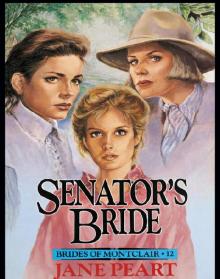 Senator's Bride
Senator's Bride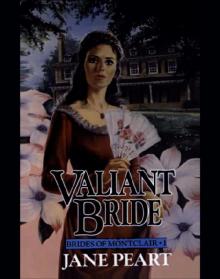 Valiant Bride
Valiant Bride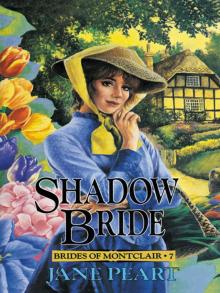 Shadow Bride
Shadow Bride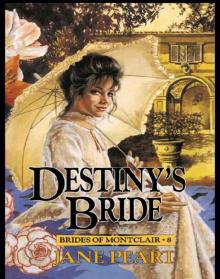 Destiny's Bride
Destiny's Bride A Tangled Web
A Tangled Web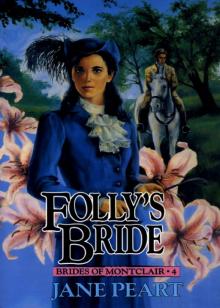 Folly's Bride
Folly's Bride The Promise
The Promise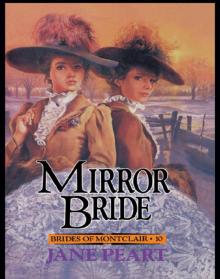 Mirror Bride
Mirror Bride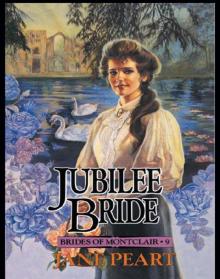 Jubilee Bride
Jubilee Bride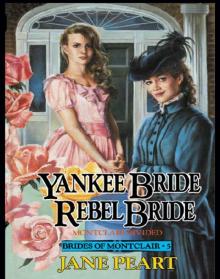 Yankee Bride / Rebel Bride
Yankee Bride / Rebel Bride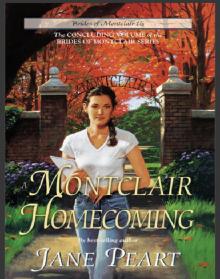 A Montclair Homecoming
A Montclair Homecoming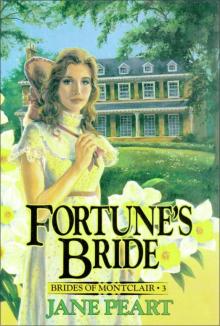 Fortune's Bride
Fortune's Bride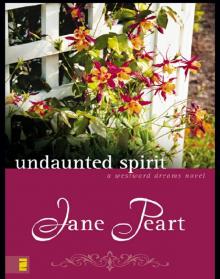 Undaunted Spirit
Undaunted Spirit Love Takes Flight
Love Takes Flight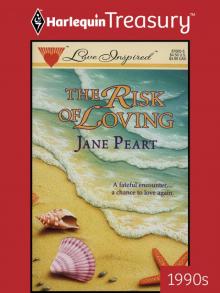 The Risk of Loving
The Risk of Loving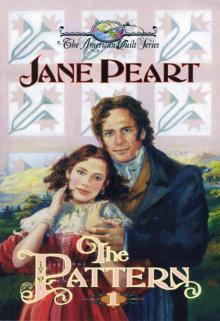 The Pattern
The Pattern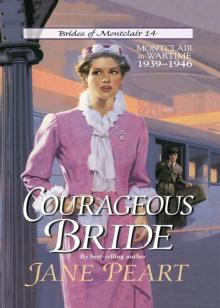 Courageous Bride
Courageous Bride